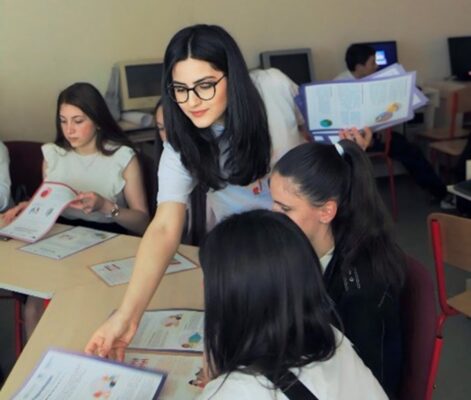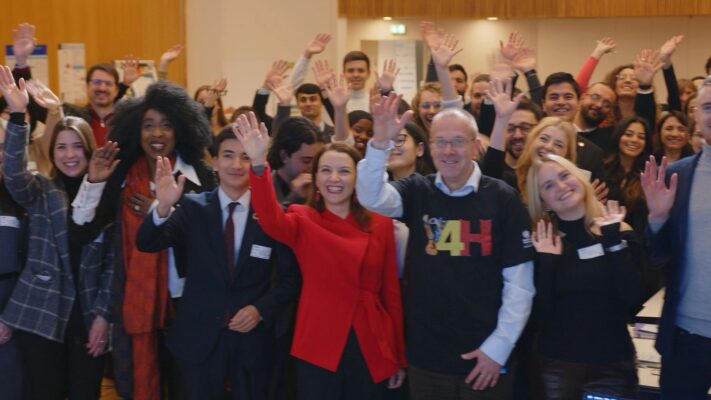Anahit Ghandilyan was on her way to a Youth4Health meeting on immunisation at the WHO Regional Office for Europe when she was struck by the unseen impact vaccination can have on people’s lives. ‘On the plane to Copenhagen, I couldn’t stop thinking about how life would be without vaccines,’ she recalls. ‘After COVID, it became evident that [without vaccines] there would be limited mobility…that this incredible opportunity to interact with colleagues at a conference simply wouldn’t exist.’

As a youth activist in Armenia, Anahit has worked with young people in her small villages on health issues, including immunisation. ‘I felt immensely proud that during and after the pandemic, I made a small contribution by underscoring the long-term and irreplaceable significance of vaccination,’ she says.
The Youth4Health event to which Anahit was travelling was part of a Europe-wide effort to engage young people in health issues that affect their lives. In the WHO European Region, every third person is under 30, making it essential that their voices are heard in conversations about the future of health. WHO Regional Director for Europe, Dr Hans Kluge, launched the Youth4Health Initiative ‘to amplify and embed youth voices and perspectives’. This reflects the potential of young activists and organisations to reach their peers and their capacity to bring innovative and fresh insights to the decision-making process.
Read more: Youth4Health
An inaugural meeting in Tirana, Albania in 2022, which brought together 500 young people and 200 senior decision-makers, was followed by an official launch of the Youth4Health network in September 2023, and the December meeting in Copenhagen – Force of the Future: Co-creating Youth Action on Immunisation – attended by Anahit and dozens of other individual youth activists and organisations.
From health professionals and patient advocates to representatives of minority groups and migrants, the network has grown to include 33 youth organisations and 175 individuals from 36 countries across the 53-member WHO European Region.
Youth action on immunisation
The WHO/Europe immunisation team collaborated with the Youth4Health Network to co-create the meeting which aimed to understand the needs of younger people and to address vaccine hesitancy in this key population group. Participants shared their own experiences and engaged with WHO technical experts, as well as discussing potential future collaborations on vaccination-related topics.
Through WHO country offices, young people and organisations were invited to submit proposals and poster contributions to showcase their work. Together, they developed sessions on:
- Vaccine misinformation: overview, context and solutions
- Improving vaccine uptake: the role of health workers
- Community engagement: approaches and challenges
- Breaking barriers: Youth perspectives on challenges to vaccine uptake
- Principles of vaccine communication: online and in person
- Vaccine advocacy in the social media era: what you need to know.
Robb Butler, Director of the Division of Communicable Diseases, Environment & Health, at WHO/Europe, says the Youth4Health initiative presents an opportunity to work with young people in a range of areas, including the flagship European Immunization Agenda 2030.
‘Achieving a world in which vaccine-preventable diseases are a distant memory rather than a constant threat is not a one-off effort,’ he says. ‘It requires sustained engagement of a broad scope of individuals and professionals to educate, promote and engage in discussions about vaccination.’
The voices of young people can be heard where those of experts may not reach. ‘In today’s world, vaccination can unfortunately be seen as a polarising issue, pushing it into the sidelines and echo chambers of public discourse,’ Robb said. ‘The engagement and contribution of students and young professionals as advocates and stakeholders of immunisation is not a nice-to-have – it is essential to our efforts to reach high vaccination coverage in every community every year. Youth advocates are ideally placed to disseminate accurate information to their peers and to engage with and raise awareness about the benefits of vaccination among their communities.’
Bringing it all back home
After the December meeting, WHO officials worked with participants on a range of activities during European Immunization Week in April 2024. These included public events, door-to-door information campaigns and university conversations, along with podcasts and videos by organisations including the International Pharmaceutical Students Federation, the European Early Career Nurses & Nursing Students’ Association and Y-PEER Albania.
In Armenia, Youth4Health members and the WHO Country Office organised an event at a school in Arevshat village, located in the Shirak region. Youth representatives provided peer-to-peer education, delivering a series of educational and interactive workshops for children and adolescents aged 10-14 years. The workshops aimed to explain the importance of vaccination and foster community engagement on the issue.
At the conclusion of the event, young people pledged to raise awareness and to disseminate their new knowledge within their communities. ‘It was incredibly heartening for me to hear from the children that they truly understood what vaccines are and how crucial they are,’ says Anahit Ghandilyan. ‘Young people are ready to engage with their families, friends and society as a whole.’
The network could become an important channel for engaging with younger people on immunisation and other issues, including tobacco control and healthy eating. ‘In the months and years to come, WHO/Europe will continue to partner with young champions of immunisation, at regional, national and subnational levels, focusing on ensuring that everyone has access to evidence-based information to help them make healthy choices now and in the future,’ Robb Butler says.

Silvia Romeo, Policy Officer at the European Cancer Organisation (ECO), and a member of the Vaccine Today Editorial Board, says the next generation can ensure vaccines are part of future policy conversations.
‘Vaccination is our most powerful weapon in the fight against preventable diseases, including cancers like cervical and liver cancers. It’s not just a solution; it’s a lifeline that can save millions,’ she says. As a youth advocate, I envision a future where these diseases are a thing of the past—thanks to vaccines. Our generation must take the lead in debunking myths and championing this life-saving innovation to protect the health of future generations.”
Youth4Health Testimonials
Kate Ndocko, European Cancer Leagues Youth Ambassador (ECL), says the Youth for Immunization event left her ‘profoundly grateful’, adding that the initiative sets a new standard for engaging younger advocates. ‘I contributed to educating about HPV gender-neutral vaccination, highlighted ECL’s efforts in youth engagement for vaccine-preventable cancers, and co-organized a dynamic session on social media advocacy,’ she says.
The initiative also gave Kate a chance to co-lead a major upcoming event for the Health Department in Lyon, focused on enhancing health rights education, screening, and vaccination coverage among vulnerable migrant populations. ‘Looking ahead, I am optimistic that the partnerships between youth ambassadors of the European Cancer Leagues and WHO will continue to expand, providing even greater spaces of expression and impact for youth advocacy in immunisation.’

Public health specialists
For young public health experts, Youth4Health is a mechanism for how to bring young people in meaningful contact with WHO experts. ‘It was a great experience of collaboration and shared learning. This inspiring experience has left us grateful for the opportunity to actively build the future of public health and vaccines, and we hope for more collaborations with WHO of this kind in the future,’ said Maryoli Veloso Fraigola and Lucia Rodriguez Borlado Salazar, Euronet MRPH. ‘We also hope other institutions will follow this example and incorporate youth perspectives in such a meaningful way.’
Pharmacists
The International Pharmaceutical Students’ Federation – European Regional Office (IPSF EuRO) developed a podcast series on improving vaccination awareness and uptake, the safety profiles of the MMR and DTaP vaccines, emerging vaccinations, vaccine accessibility, vaccine hesitancy, and importantly the role of young people in promoting vaccinations.



